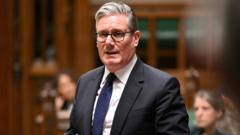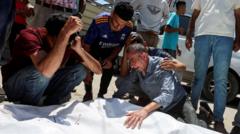Is the Foreign Office in Hot Water Over the Harry Dunn Case?

Understanding the Harry Dunn Case: A Family's Fight for Justice
The tragic case of Harry Dunn, a 19-year-old motorcyclist who lost his life in a crash outside RAF Croughton in Northamptonshire, has sparked a significant outcry from his family and the public. The incident, which involved a car driven by Anne Sacoolas, who was on the wrong side of the road, has raised critical questions about diplomatic immunity and the responsibilities of government bodies in handling such sensitive cases. As the Dunn family prepares for an inquiry into how the Foreign Office managed the case, it is essential to explore the various dimensions of this heartbreaking story.
Timeline of the Incident
To fully comprehend the complexities surrounding the Harry Dunn case, let’s take a closer look at the key events leading up to and following the tragic accident:
- August 27, 2019: Harry Dunn is involved in a fatal motorcycle accident after his bike is struck by a car driven by Anne Sacoolas.
- Immediate Aftermath: Sacoolas leaves the UK shortly after the incident, claiming diplomatic immunity.
- September 2019: The Dunn family begins to campaign for justice, calling for accountability from both the UK and US governments.
- 2020: The family meets with government officials, expressing their anger and frustration over how the case has been handled.
- 2022: Sacoolas pleads guilty to causing death by careless driving and is given an eight-month suspended sentence.
- 2023: An inquiry into the Foreign Office's handling of the case is announced, aiming to address the family's concerns.
The Role of Diplomatic Immunity
The concept of diplomatic immunity is pivotal in understanding the Harry Dunn case. Diplomatic immunity is a principle of international law that protects foreign diplomats from legal action in the host country. This legal shield can lead to perceived injustices, especially in cases involving serious accidents or criminal acts.
In Harry Dunn's case, the US government claimed that Sacoolas had diplomatic immunity, allowing her to leave the UK without facing prosecution for her actions. This decision incited a wave of anger among the Dunn family and the public, who felt that justice was being denied due to legal technicalities.
The Dunn Family's Fight for Justice
The Dunn family has been steadfast in their pursuit of justice for Harry. They have criticized both the UK and US governments for their handling of the situation, arguing that there was a failure to provide adequate support and transparency throughout the process. Charlotte Charles, Harry's mother, has been particularly vocal about her frustrations, describing the government's response as "rude" and "brutal."
As the family prepares for the inquiry into the Foreign Office's actions, they hope it will lead to accountability and prevent similar situations in the future. Charlotte Charles emphasized that this inquiry is not just about their family but about ensuring no other family has to endure the same pain and frustration. She expressed hope for a "genuine, independent search for truth."
The Inquiry: What to Expect
The inquiry into the Foreign Office's handling of the Harry Dunn case is set to be chaired by former Chief Inspector of Prisons Dame Anne Owers. The scope of the inquiry will focus specifically on the actions and responses of the UK government, while intentionally excluding the involvement of the US government or any previous court proceedings.
Key areas of focus for the inquiry may include:
- The advice given to the Dunn family regarding diplomatic immunity.
- The communication between the Foreign Office and the Dunn family.
- The protocols followed by UK authorities in the aftermath of the accident.
- The handling of the investigation by local law enforcement, particularly Northamptonshire Police.
Criticism of Northamptonshire Police
Recently, an independent report criticized Northamptonshire Police for their handling of the investigation. It highlighted that while Sacoolas was in a state of shock, she "could and should have been arrested" at the scene. The police department has since apologized for its shortcomings, acknowledging that they did not do "the very best for the victim."
This criticism adds another layer of complexity to the case, as it raises questions about the effectiveness of law enforcement in cases involving foreign nationals and diplomatic personnel. The Dunn family's experience underscores the need for improved protocols and communication in such sensitive situations.
The Impact on International Relations
The Harry Dunn case has not only affected the family but has also put a strain on UK-US relations. The incident has led to public discussions about the implications of diplomatic immunity and how it can be reformed to prevent similar situations in the future. The family’s ongoing struggle has highlighted the need for greater accountability and transparency in international legal matters.
As the inquiry unfolds, it will be crucial to observe how the findings influence future diplomatic relations and the treatment of cases involving foreign nationals. It may prompt policymakers to reconsider the boundaries of diplomatic immunity, especially in cases that result in serious harm or loss of life.
The Role of Public Support
The support from the public has been instrumental in amplifying the Dunn family's voice. A significant outpouring of sympathy and anger has resonated with many who view the case as emblematic of broader issues within the justice system. Activists and community members have rallied around the Dunn family, advocating for justice and ensuring that Harry's story remains in the public consciousness.
Social media campaigns and public demonstrations have played a crucial role in raising awareness and garnering support. The family's resilience and determination have inspired many to stand up against perceived injustices, reinforcing the importance of community solidarity in the face of adversity.
Moving Forward: The Family's Hopes
As the inquiry into the Foreign Office's actions commences, the Dunn family remains hopeful that it will lead to meaningful change. They are seeking acknowledgment of the pain they have endured and a commitment from both governments to improve their handling of similar cases in the future.
Charlotte Charles has expressed a desire for the inquiry to be a catalyst for reform, ensuring that no other family has to suffer the same anguish. She believes that transparency and accountability are essential for healing and closure.
Conclusion: A Call for Justice and Reform
The tragic story of Harry Dunn serves as a poignant reminder of the complexities surrounding international law and the implications of diplomatic immunity. The inquiry into the Foreign Office's handling of the case represents a critical opportunity for accountability and reform. As the Dunn family continues their fight for justice, their story resonates with many who believe in the importance of fairness and transparency in legal matters.
As we look ahead, it is essential to reflect on the broader implications of this case and consider how we, as a society, can work together to advocate for justice and ensure that no family has to endure such heartbreak again. Will this inquiry pave the way for necessary reforms in diplomatic immunity, or will it merely serve as a reminder of the shortcomings in our legal system? The answer remains to be seen.
Frequently Asked Questions
What happened in the Harry Dunn case?
Harry Dunn, a 19-year-old motorcyclist, was killed in a crash involving a car driven by Anne Sacoolas, who claimed diplomatic immunity and left the UK shortly after the incident.
Why is diplomatic immunity a contentious issue?
Diplomatic immunity can prevent legal action against foreign diplomats, leading to perceived injustices in cases involving serious accidents or crimes.
What are the Dunn family's main concerns?
The Dunn family is concerned about the handling of the case by both the UK and US governments, particularly regarding the advice given about immunity and the lack of support they received.
What is the purpose of the inquiry into the Foreign Office?
The inquiry aims to investigate how the Foreign Office managed the Dunn case, focusing on their communication with the family and the protocols followed after the accident.
How has the public supported the Dunn family?
The public has rallied around the Dunn family through social media campaigns and demonstrations, advocating for justice and greater accountability in similar cases.
In reflecting on the ongoing journey of the Dunn family, one must consider: How can we ensure that justice is not only sought but achieved for victims and their families in similar circumstances? #JusticeForHarry #DiplomaticImmunity #FamilyResilience
Published: 2025-06-26 09:39:22 | Category: technology



